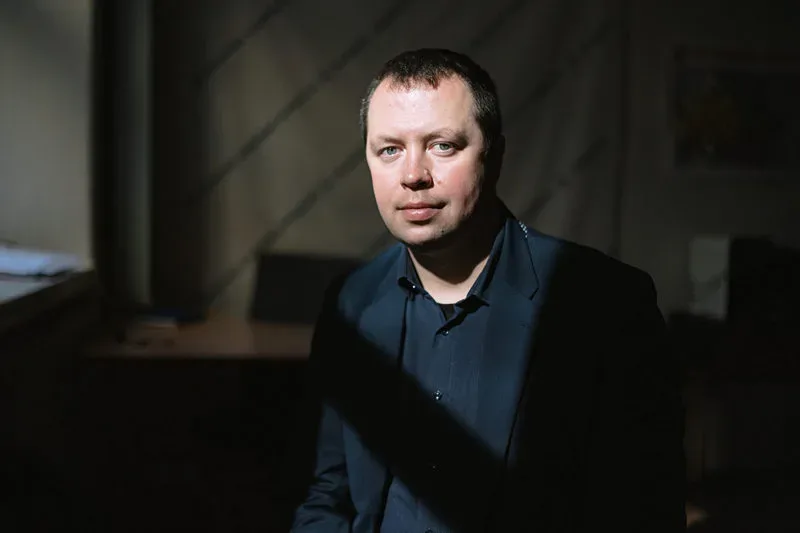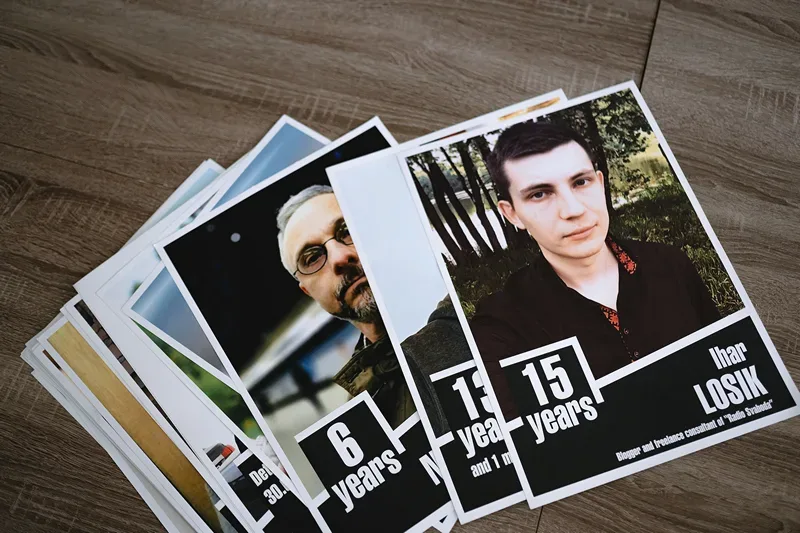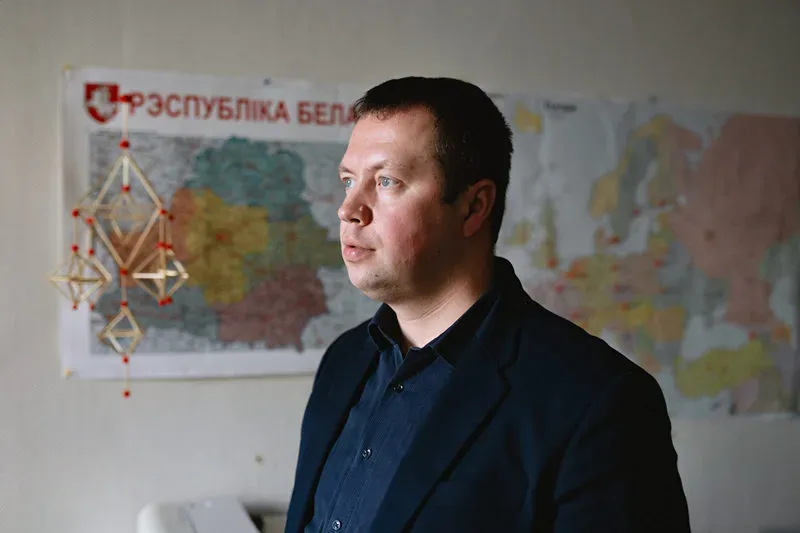BAJ: «Belarusian independent media are technologically ahead of the media markets of neighboring countries»
The Belarusian Association of Journalists (BAJ) was dissolved by the authorities in 2021. Quickly resuming its activities abroad, the organization continues to keep the international journalistic community’s attention on the dire state of freedom of speech in Belarus. Reform.news spoke with BAJ Deputy Chairman Barys Haretski about how, despite repression and reduced funding, Belarusian media manage to stay at the technological forefront and maintain the trust of the Belarusian audience.

Barys Haretski. Photo: Reform.news
— Human rights activities have extended beyond Belarus. Journalists in exile need legal assistance. Unfortunately, it seems that this focus will remain necessary because 37 of our colleagues are imprisoned, and the trend is not improving.
Boris explains that there were years when the educational direction took precedence in BAJ’s work. At that time, there was less pressure on the media, and education was the most relevant issue. Training programs still exist today.
— And now there is still a demand for education, new technologies, new tools, and it is important for media professionals to understand how to work with them. However, the demand is slightly lower now for several reasons: today Belarusian independent media are technologically ahead of the media markets of neighboring countries—2020 gave us all a huge push to work very quickly and deeply. On the other hand, today the media sector is in very difficult conditions. When you’re in survival mode, you think less about education and more about how to find the means to continue your work.
A significant part of the work involves international information efforts. BAJ is a member of numerous international organizations: including the International and European Federation of Journalists, IFEX, and collaborates with Reporters Without Borders, the Committee to Protect Journalists, and many national journalist unions and associations in Europe. Barys explains that information is collected from public and private sources for distribution and to inform international organizations about the state of Belarusian media.
— Working together with international partners, we create opportunities for journalists, promote the Belarusian issue, so that Belarus remains on the agenda.
Before its legal dissolution in 2021, BAJ had a strong system of regional branches and communities because independent journalism in the regions was always a strong focus. With the legal dissolution and the designation of BAJ as an extremist formation, the organization cannot conduct any activities within Belarus.
— Our regional focus today has expanded to six countries where colleagues and media operate: Belarus, Lithuania, Poland, Georgia, Germany, and Ukraine. Wherever Belarusian journalists are, there are needs. The main thing that has changed since 2020 is the working conditions.

Barys Haretski. Photo: Reform.news
Before the dissolution, members paid dues and accordingly had priorities in certain educational and organizational opportunities. Since 2020, BAJ has done everything for media professionals, regardless of whether the person is a member of the organization or not.
— Even though the Supreme Court illegally dissolved us, for BAJ, all members remain members. And of course, today we help with our programs not only BAJ members. The only thing exclusive to BAJ members is the international press card from IFJ. The International Federation of Journalists issues press cards only to members of national journalist unions. Regarding repressed colleagues and those imprisoned, each and every one of them is important to us, regardless of whether they are in BAJ or not.
Currently, BAJ has about 1,300 members. After being recognized as an ‘extremist formation’, there was even a certain surge in joining the organization as people expressed their solidarity.
— What did we lose due to the legal dissolution? Due to the dissolution, BAJ lost the ability to publish its official magazine, ‘Abazhur’. However, under the current circumstances, we still could not publish it in Belarus. The work of the BAJ Ethics Commission also became impossible. In previous years, the commission was an important body where society, legal entities, and individuals could file complaints against the media. In 2021, the commission ceased its work because even approaching it has now become ‘illegal’ from the perspective of law enforcement.
Legal entities or individuals could file complaints against any media if they felt their rights were violated. This was an essential mechanism for professional regulation, Boris explains.
«Journalists don’t have rubber batons, bullets, or handcuffs. We have words»
BAJ regularly publishes the electronic bulletin «Media in Belarus», «Monitoring of Freedom of Speech», and others. These are professional studies that record the level of freedom of speech and incidents involving the media in Belarus. According to Barys, such documents are necessary because they are tools for influencing the situation.
— Journalists don’t have rubber batons, bullets, or handcuffs. We have words. Journalists can highlight a problem for society through informational activities, and we talk about the problems of Belarusian media freedom. Clearly, operational reports, for example, about the detention of journalists, are more aimed at our society. Monitoring and research are done to show the world what the situation with freedom of speech in Belarus really looks like. Sometimes you suddenly hear voices from foreign colleagues saying that it doesn’t seem so bad in Belarus. In reality, the situation is terrible.

Photo: Reform.news
Currently, Belarus is ranked 157th in the World Press Freedom Index by Reporters Without Borders. According Boris, most of these rankings consist of local monitoring reports released by organizations protecting the rights of the journalistic community.
— Unfortunately, today we can say very little about our activities publicly. There are programs to support journalists, legal support in Belarus and abroad. For this, our lawyers work. We can still review materials and advise people before and after publication.
In addition, last year, the national journalism competition ‘Free Word’ was revived. Previously, only members of the organization could participate, but now the competition is run by the European Federation of Journalists (to avoid ‘extremist’ threats to colleagues), so anyone can join. The conference based on the results of the competition is an important journalistic event because it records the state of Belarusian journalism, says Barys.
— Also, over the past year, BAJ and its partners have held more than 25 various solidarity actions in support of Belarusian journalists in different countries around the world, from Australia to Canada. Photos and names of political prisoners are on the BAJ website.
Anyone or any organization can print portraits and support the imprisoned. Barys considers imprisoned journalists, the situation with freedom of speech, and the intensification of repression to be the main challenges for the community.
— Working as a journalist in Belarus is impossible, so the media sector is seriously suffering. Instead of national publications like ‘Zerkalo’, ‘Nasha Niva’, and regional publications, pseudo-public-political publications like ‘Tochka.by’, ‘Sputnik’ are being created. Under the guise of independent journalism, pro-government media are spreading.
The websites of independent media are blocked, and subscribing to Telegram can be dangerous. The media landscape is changing, and the Belarusian audience is increasingly cut off from truthful information, Barys notes.
— On the other hand, there is a plus in the development of technology. With blocked sites, we have rocket pages, prompting services, YouTube. Even if a person is not subscribed to the media, they can see the video in trends. Readers have learned to use anonymizers and VPNs.

Photo: Reform.news
«The dictatorial regime wants people to follow like obedient sheep to wherever Azaronak points»
Three years ago, «KP in Belarus» journalist Henadz Mazyeyka was imprisoned for a simple comment he took from a friend of Andrey Zeltsar. Working as a socio-political journalist in Belarus is undoubtedly dangerous, but it cannot be said that journalism in Belarus doesn’t exist, believes the deputy chairman of BAJ. A few independent regional publications remain in Belarus, albeit ones that are as far removed from politics as possible.
— Media that have relocated abroad have found the strength to reformat and produce quality journalistic content for Belarus from outside. However, we must admit that our work abroad is affected by the state’s secrecy. Even simple information is filtered and statistics are altered, making it more challenging to work now.
Barys shares the BAJ saying: in elections, politicians fight, but journalists suffer. A series of repressions against all independent media accompany every election cycle. The authorities see journalists as their main enemies.
— The dictatorship believes that a problem doesn’t need to be fixed if no one knows about it. For them, the problem is when society learns about the issue. This was also true in the Soviet Union, where any critical information was banned. The dictatorial regime wants people to follow like obedient sheep to wherever Azaronak points. So that people don’t look at their salaries, the number of political prisoners, or suddenly see how people live in a free European society. That’s why journalists are targeted because it could be different.
Journalists are accused of leading people to protest, Barys continues, but that is not true.
— In 2020, society encountered information that could not leave people indifferent. Yes, this information was spread by the media. Yes, they reported on those who died from coronavirus. Yes, they reported on those beaten at protests. By reading truthful independent media, people took to the streets because it couldn’t go on like that.

Photo: Reform.news
«Our publications are a success story»
After being forced to leave, the situation in the media changed. In Belarus, media could earn money from advertising, but now those opportunities are significantly less. Much depends on donors, Barys explains.
— But colleagues are also striving for self-monetization. For example, ‘Zerkalo’ has enough advertising slots — which means some advertising revenue goes to the editorial office. However, the volume of such income is, of course, not comparable to the times when we worked in Belarus.
The donor market is also changing. Until 2022, Belarus was the only country in the region that required significant financial support for independent media work, Barys continues.
— After the start of the full-scale invasion, the media sectors of three countries in our region simultaneously need support: Belarusian, Ukrainian, and liberal Russian. There is a certain competition. However, Belarusian media are well-regarded. Our metrics show that Belarusian media have not lost their audience. This is not like Russian publications, which cover a small percentage of the entire Russian audience. Our publications are a success story.
In some European countries, there is a certain reverence for Russia, so they are ready to spend more money on Russian media, Barys observes.
— The difference between Belarusian and Russian publications is that Belarusian media can reach their audience. According to various estimates, today, the independent Belarusian media sector accounts for about a third of the entire Belarusian audience. That’s about three million people. Funding Russian media is like adding drops to the ocean.
Boris is keeping an eye on recent developments around the TV channel «Belsat». He believes it would be very tragic if funding suddenly halved, as has been publicly stated.
— If tomorrow half or even a third of the channel’s staff find themselves out on the street, we will have a large number of unemployed Belarusian media professionals. And they can’t just move to other publications because those publications don’t have such opportunities.
Despite the new challenges, Barys Haretski hopes that globally in 2024–2025, the Belarusian independent media sector will be more or less okay.
— I hope the Belarusian media sector will remain approximately the same as it is now. And if we’re lucky, it will even expand with new ambitious projects. The amount of money may decrease, but new technologies and new ways of reaching the audience are emerging.
When asked what motivates him to continue his activities, Barys responds:
— My colleagues in prison motivate me. They are not abstract figures. I worked together with Poczobut, and we traveled a lot. I worked with Katerina Andreeva at many events. Andrei Alexandrov was once the deputy chairman of BAJ. You could approach Marina Zolotova, the editor-in-chief of TUT.by, with any question. They are behind bars — that’s my motivation to continue. They are my friends, and I can imagine what a trial it is to be in a prison cell. I could be in their place if I hadn’t left in time. It’s their fate, we must think about them and strive to free them all.
 @bajmedia
@bajmedia
